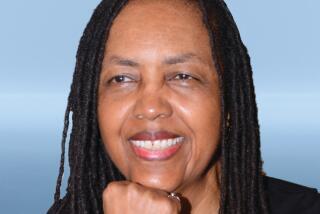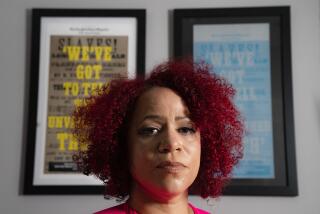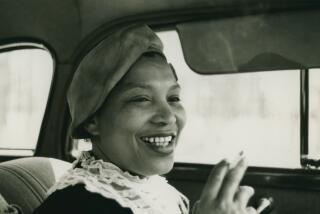Her eyes were watching
I have a kind of collect-them-all affection for the PBS biographical series “American Masters,” now in its 22nd year and happily catholic in its definition of who qualifies as an American Master. Jasper Johns, Julia Child and James Brown, to name just three whose names start with J.
Some editions are better than others, of course, and few are really critical of their subjects, even when allowing a peek at the warts -- their American mastery is expressed and explicated, yet always taken as read. But most all are better than what passes for “biography” on most other networks, where a couple of hit records or a popular sitcom is considered reason enough to haul a star’s old elementary school teacher in front of a video camera. (There are a lot of hours of TV to fill.)
It takes a little more than that to become an American Master. The latest episode, airing tonight, “Zora Neale Hurston: Jump at the Sun,” concerns the author of “Their Eyes Were Watching God,” which, most famously, Oprah Winfrey and Halle Berry converted into a TV movie a few seasons back.
But Hurston wrote other novels, nonfiction books, plays, and newspaper and magazine articles. The first African American to graduate from Barnard College, she was a charter member of the Harlem Renaissance and an ethnographer who documented Southern black folkways on the page and on film -- some of that footage is seen here. She put that culture on stage as well, calling it “the greatest wealth of the continent” and warning, “This stuff won’t last long.”
She is described here, not necessarily by people who knew her, but people who have spent their lives coming to feel as if they did, as “bodacious,” “outrageous,” “feisty,” “raunchy” and “a rebel.” (Photographs show a lively, confident woman of whom this certainly could be true.) “She seems to have been herself all the time,” says one commentator. A woman whose early hero was Hercules, Hurston was independent even to a fault, and though she was passionate about her roots, she was not political about her race. “I am not tragically colored,” she wrote. “I do not weep at the world. I am too busy sharpening my oyster knife.”
Enthusiastic talking heads include Alice Walker, who placed a headstone on Hurston’s unmarked grave -- “A Genius of the South,” it read -- and helped revive interest in the author. Maya Angelou sings two styles of blues. There are residents of Eatonville, the all-black Florida town where Hurston grew up, and Dorothy West, who knew Hurston in Harlem. (West died in 1998: Producer Kristy Andersen worked on the film for 18 years.) The seemingly ubiquitous Henry Louis Gates Jr. for once appears as the literary theorist he is: For Gates “Their Eyes Were Watching God” is “a novel about the capacity of the African American vernacular to narrate a novel, to tell a story.”
That use of vernacular, and its apolitical story of a woman’s self-discovery, put it out of favor with African American critics of the time -- though it was praised by the white press. Richard Wright, not yet the author of “Native Son,” was particularly dismissive, and even Hurston’s old mentor, Alain Locke, termed it “pseudo-primitive.” (She called Locke a “malicious little snot” in return. “I will send my toenail to debate him on what he knows about Negroes and Negro life.”)
As the century wore on, Huston fell out of fashion, and further out of step. A “bootstrap Republican,” she found forced desegregation insulting to black culture, which she regarded as self-sufficiently rich and varied.
She published her last novel in 1948, wrote more novels she couldn’t get published, and died in 1960 with her books out of print. But they are all back now.
--
‘American Masters: Zora Neale Hurston: Jump at the Sun’
Where: KCET
When: 9 tonight
Rating: TV-PG (may be unsuitable for young children)
More to Read
Sign up for our Book Club newsletter
Get the latest news, events and more from the Los Angeles Times Book Club, and help us get L.A. reading and talking.
You may occasionally receive promotional content from the Los Angeles Times.








